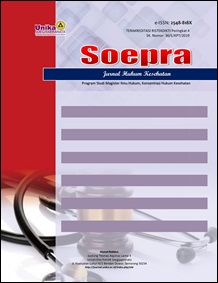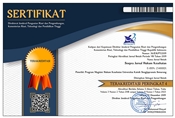Dimensions of Ethics and Telemedicine in Indonesia: Enough of Permenkes Number 20 Year 2019 As a Frame of Telemedicine Practices in Indonesia?
Abstract
Telemedisin in Indonesia was known a few years ago but unfortunately did not make progress in its implementation. As technology developed during the Industrial Revolution 4.0 era, Indonesia returned to pay attention to the telemedicine system. One manifestation is the enactment of Minister of Health Regulation No. 20 of 2019 concerning the Implementation of Telemedicine Between Health Service Facilities. In the preamble of this Permenkes, it appears that the spirit of doing telemedicine is in order to bring health services closer and improve the quality of health services in health facilities in remote areas that prioritize patient interests and safety. Despite the fact that telemedicine currently available in Indonesia is more personal between doctors and patients. Of course, this can be considered to violate existing regulations, because there are no rules that frame them. In addition to the benefits derived from telemedicine because health services for remote areas are increasingly affordable and faster, there are still many obstacles in terms of ethics and law. In legal matters, the lack of rules that frame the implementation of telemedicine can jeopardize the position of doctors in the event of a medical dispute. In terms of ethics, there are still a number of things that are not in accordance with the principles of bioethics, namely beneficence, non-maleficence, autonomy, and justice. It is feared that the doctor-patient relationship will fade in telemedicine. The doctor's professional standard is also the case, because a doctor may not be able to conduct a direct examination of patients. There are still many obstacles in the implementation of telemedicine that this should be a challenge for the Indonesian government through the Ministry of Health to pay more attention and make clearer rules to frame the implementation of telemedicine in Indonesia.
Keywords
Full Text:
PDFReferences
Kode Etik Kedokteran Indonesia, tahun 2012
Manual Persetujuan Tindakan Kedokteran, Konsil Kedokteran Indonesia, 2006
Atac, Adnan., Kurt, Engin, Yurdakul, Eray., An Overview to Ethical Problems in Telemedicine Technology, Social and Behavioural Science 103(2013)116-121
Beauchamp, Tom L. and James F.Childress, Principles of Biomedical Ethics, 7th edition, Oxford University Press, New York, 2013.
Boxer, Richard J., Telemedicine in Global Context, mHealth 2015;1:12, available at : www.themhealth.org
Clark, Peter A., Capuzzi, Kevin., Harisson, Joseph., Telemedicine : medical, Legal, and Ethical Perspectives, Med Sci Monit, 2010;16(12):RA261-272
Darkins, Adam W. and Cary Margaret A. Telemedicine and Telehealth (Principles, Policies, performance, and Pitfalls, Springer Publishing Company Inc., New York, 2000
Duquenoy, Penny., George, Carlisle., Kimppa, Kai., Ethical, Legal, and Social Issues in Medical Informatics, Medical Information Science reference, New York, 2008
Doherty, Regina F., Purtilo, Ruth B., Ethical Dimension in The Health Proffesions, Elsevier, USA, 2016
Pengurus Besar Ikatan Dokter Indonesia, Telemedisin Rekomendasi IDI Untuk masa Depan Digitalisasi Kesehatan di Indonesia, 2018
WHO, Telemedicine Oppurtunities and Developments in Memver States : Report on The Second Global Survey on eHealth, Global Observatory for eHealth Series, Vol.2, 2009
Konsil Kedokteran Indonesia, Penyelengaraan Praktik Kedokteran yang Baik di Indonesia, 2006
Nugraha, Dwi C., An Overview of e-Health in Indonesia : Past and Present Applications, IJECE Vol.7, No.5, October 2017:2441-2450
Oh, Ji-Young., Park, Yaoung-Taek, Jo, Emmanuel C., et al., Current Status and Progress of Telemedicine in Korea and Other Countries, Healthc Inform Res, 2015, October;21(4):239-243
Prawiroharjo, Pukovisa., Mulyana, Rudi M., Pratomo, Sidi., benarkah Dokter Spesialis yang Tugas Jaga Pasti Melakukan Pelanggaran Etik Jika Sekedar menjawab Konsul per Telepon Untuk Pertolongan Kegawatdaruratan ?, Jurnal Etika kedokteran Indonesia Vol.2, 2018;2(1):31-9
Prawiroharjo, Pukovisa., Pratama,Peter., Librianty, Nurfanida., Layanan Telemedis di Indonesia : keniscayaan, risiko., dan Batasan etika, JEKI. 2019;3(1):1–9. doi: 10.26880/jeki.v3i1.27.
Santosa, Frans., Purwadianto, Agus., Sidipratomo, Prijo., et al.,Sikap Etis Dokter pada Paien yang “Mendiagnosis” Diri Sendiri menggunakan Informasi Internet pada Era Cyber Medicine,Jurnal Etika kedokteran Indonesia Vol.2, 2018;2(2):53-7
Stanberry B., Telemedicine: barriers and opportunity in the 21st century, Journal of imnternal medicine 2000;247:615-628
Tarigan, Irwan J., Alamsyah, Bhakti., Aryza, Solly., et al., Crime Aspect of Telemedicine Health Technology, International Journal of Civil engineering and Technology, Vol 9, Issue 10, October 2018, pp.480-490
Tuckson, Reed V., Edmunds Margo., Hodgkin Michael L., Telehealth, The New England Journal of Medicine, 2017;377:1585-1592
www.bps.go.id
DOI: https://doi.org/10.24167/shk.v6i1.2606
Refbacks
- There are currently no refbacks.
Copyright (c) 2020 SOEPRA Hukum Kesehatan







